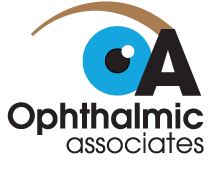Age-Related Macular Degeneration, also called AMD, is a disease associated with people over the age of 60. This disease destroys the sharp, central vision that we use in everyday activities such as reading and driving. AMD affects the macula; the part of the eye that is located in the center of the retina and allows the eye to register fine details. It gives us our sharpest central vision (20/20) and our best color perception.
People with a family history of macular degeneration are at greater risk of developing the disease. Macular degeneration is divided into two forms. The “dry” form is the most common and accounts for about 90 percent of all macular degeneration cases. The “wet” form, also called the exudative or neovascular form, accounts for the other 10 percent. It is the more severe form and can be associated with more rapid and severe vision loss.
Wet macular degeneration is associated with the development of abnormal blood vessels that grow within the layers of the retina. The “neovascularization” can bleed, leak and physically cause damage to the retinal layers. Wet macular degeneration also affects both eyes and can destroy vision in a matter of days or weeks. Vision loss is often severe.



